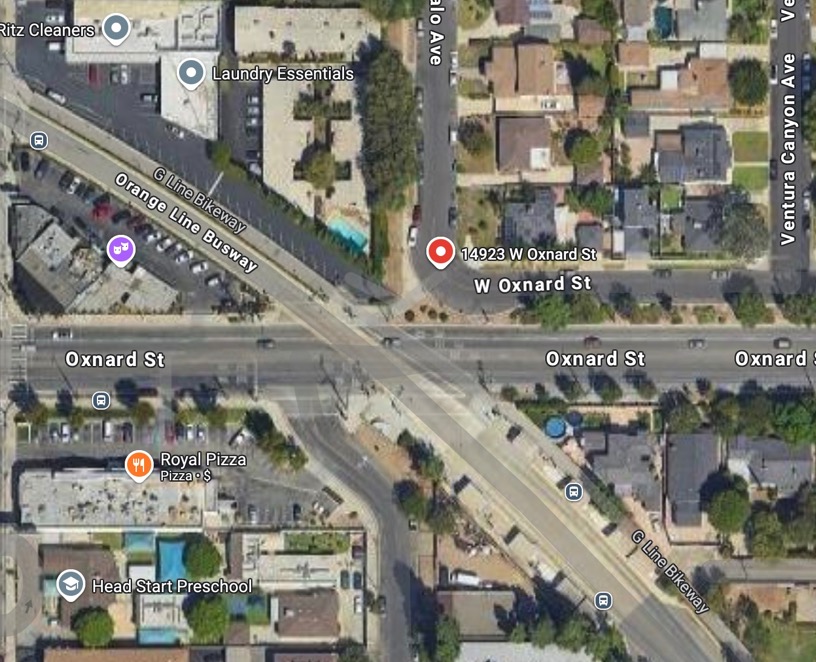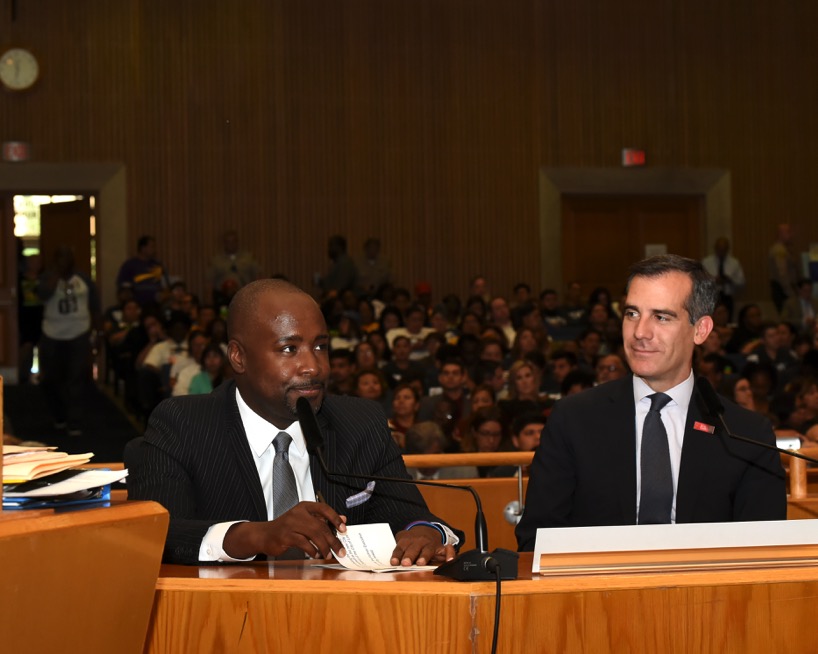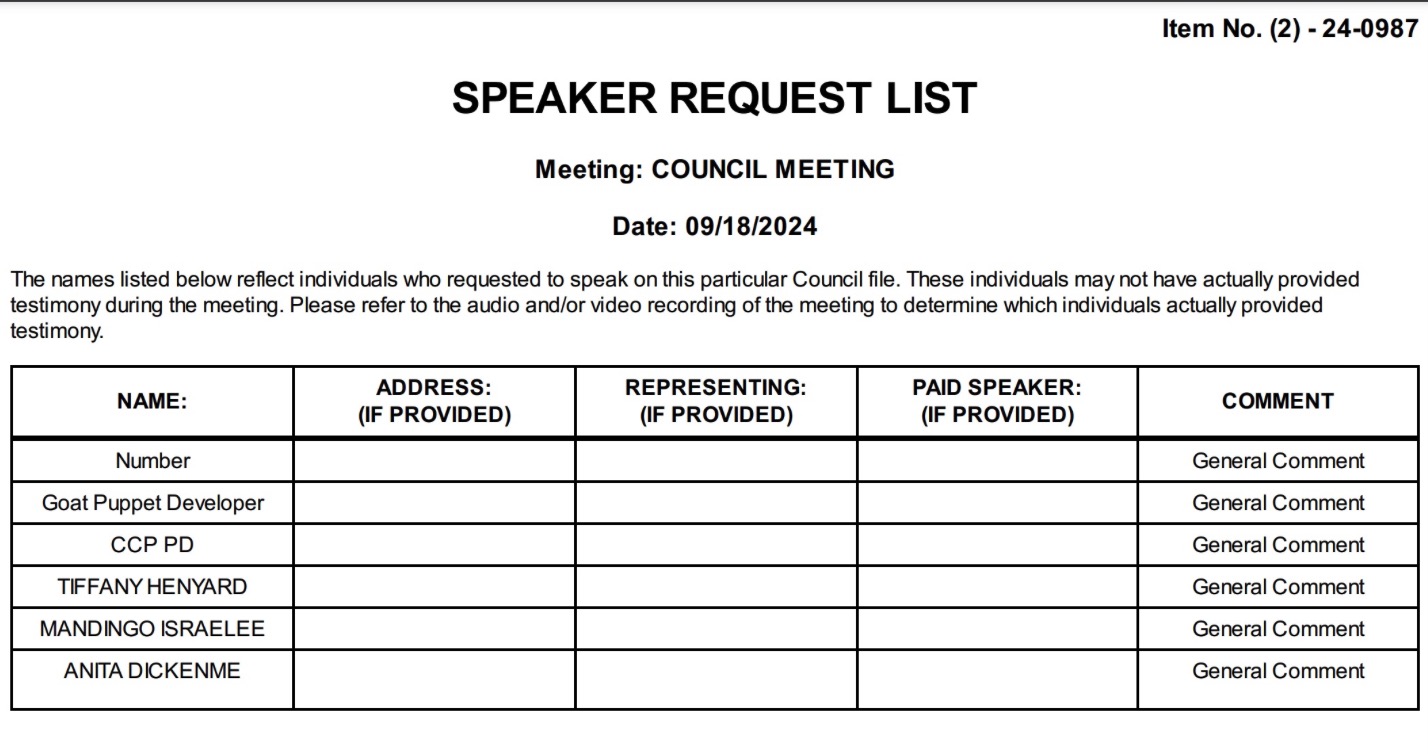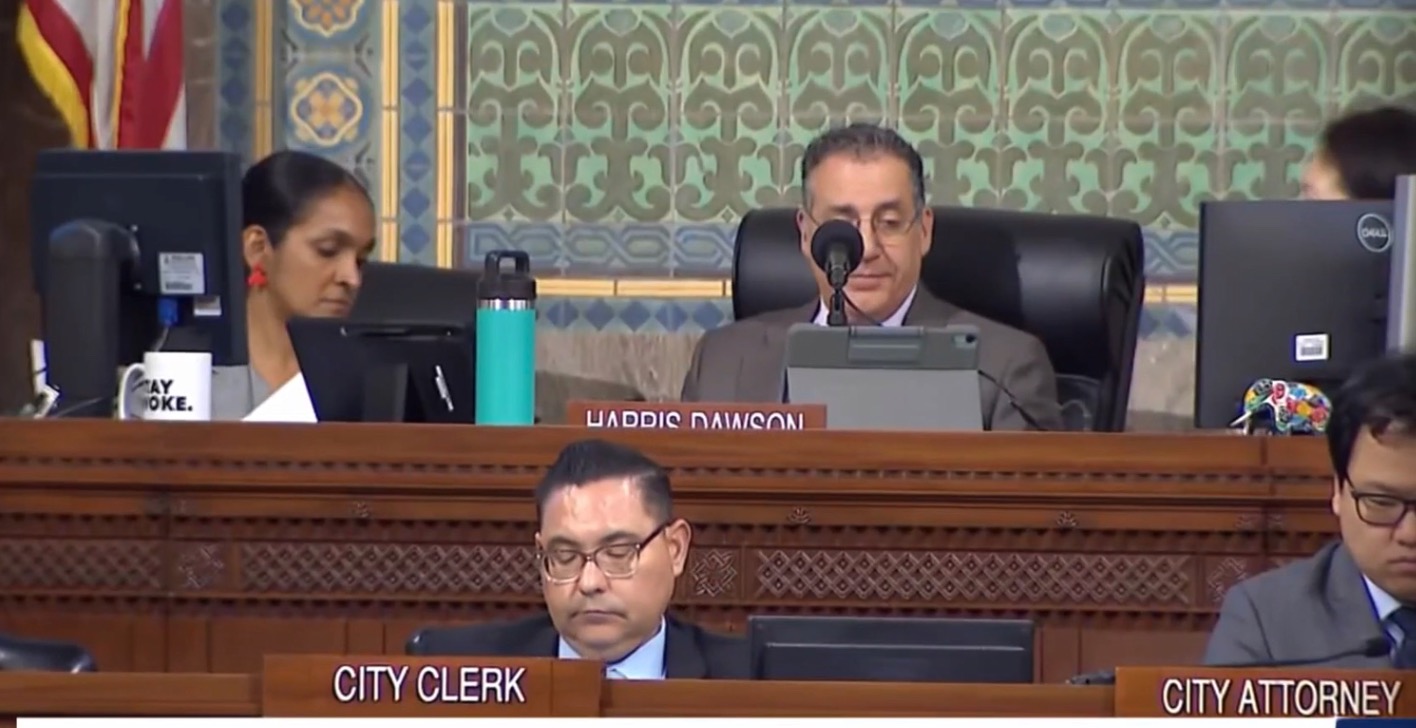Comments
ERIC PREVEN'S NOTEBOOK - Tuesday's city council agenda includes a call-in option for public comment and the city hopes to collect 17 liens valued at $42,459 from constituent residents. Marqueece Harris-Dawson in the house!
Item (23) 24-0900-S32 determines that a majority protest exists in the Street Lighting Maintenance Assessment District, an extremely rare finding, preventing the enactment of the assessment in Council Districts 4 and 6. One can't help but wonder which council member Nithya Raman or Imelda Padilla stepped in to help this community fight this issue—after all, "nothing to see here, keep moving."
The Council will be considering a finding of “public convenience or necessity” regarding the sale of alcoholic beverages for off-site consumption at Oxnard Liquor owned by Hayk Yavryan, situated at 14923-14927 West Oxnard Street, Unit Space A. Right near the Orange Line.

Items 27-39, though interesting, and Marqueece Harris-Dawson's first real meeting as President will not be open to the public.
The Energy and Environment Committee Report (20-1176) proposed an ordinance to amend LAAC Section 5.168.1, allowing the issuance of a replacement subordinate bond (WIFIA Bond) and creating a construction fund for proceeds. The total debt service for the $224 million bond is projected at $292 million over 31 years, with payments coming solely from the Sewer Construction and Maintenance Fund, and no impact on the General Fund. [Sheesh!]
The Navajo Large Generator Interconnection Agreement (24-0937) was approved, delegating authority to amend the agreement. There is no expected financial impact from this agreement, and it will not affect the General Fund.
A quitclaim of LADWP’s easement for telephone lines and poles in San Bernardino (24-0940) was approved, generating one-time revenue of $6,420 to LADWP's Power Revenue Fund.
An amendment to the Tenant Anti-Harassment Ordinance (14-0268-S18) was requested to align it with State and Federal statutes. No financial analysis was provided, but potential costs could arise from enforcement and legal proceedings.
Appointments included William Saxe Epps to the Affordable Housing Commission, Taylor Holland and Daniela Solano to the House LA Citizens Oversight Committee, and Gregory Lippe to the Police Permit Review Panel. These appointments are subject to financial disclosure and background checks, but no direct costs were mentioned. [Why no comment allowed?]
The LAPD is seeking authorization to apply for and accept a $998,099 grant from the California Highway Patrol for the 2024-25 Cannabis Tax Fund Grant Program, with a $30,000 contract for phlebotomist services.
The Economic and Workforce Development Department will implement the Sidewalk Vending Cart Program through contracts totaling $2,162,625, including a $1,662,625 MOU with LA County and a $500,000 outreach contract. Funding will come from various sources with no impact on the General Fund.
A joint report from Los Angeles World Airports and the Library Department regarding banned book access at LAX was filed, with no financial implications. The report emphasized providing airport access to banned books for the traveling public.
Items open for public comment include:
The Declaration of Local Emergency was renewed for 90 days to address homelessness in Los Angeles, with no financial implications stated. [Pfffft.]
$400 was transferred from the General City Purposes Fund for CD 12’s LA for All recognition, with a financial impact of $400.
Smart Speaker: "The LA For All campaign, a push for inclusivity under Mayor Garcetti, feels increasingly distant. Staffer B’s $400 retroactive initiative to illuminate City Hall is ironic and too late. Recent meetings have been clogged with praise for outgoing President Krekorian and incoming Marqueece Harris-Dawson, silencing important voices. On Friday, several speakers including Daniel Guss reported having their hands lowered, accompanied by the bald-faced lie, "there are no more speakers in the queue." How sleazy is Markeezy?

Marqueece Harris-Dawson (CD8) and the Former Mayor & current Ambassador to India, Eric Garcetti (CD13) bow before the mighty Supervisors.
Derek Powell’s appointment to the Central LA Area Planning Commission will likely be approved, pending a background check, with no associated costs. A vesting zone change at 3600 Wilshire Blvd will be approved to allow new mixed-use buildings, with costs covered by fees. The appeal for 10756 Wilkins Ave will be denied, allowing increased density and multi-family dwellings, with costs recovered through fees. The Council Committee structure will be restructured, creating new committees and adjusting jurisdictions, with no financial implications mentioned. The devil is in the details.
Smart Speaker: It’s odd how the LA Times devotes extensive coverage to a disturbing case involving a UCI professor in Europe, yet ignores a bigger issue in LA: Casey Wasserman. Despite his deep ties to city officials and his role leading the LA28 Olympic committee, Wasserman remains unexamined by the paper. Given his influence and involvement in major projects, this silence raises questions. Is the paper avoiding the story due to Wasserman’s wealth and connections? Investigative journalism should focus on powerful figures like him. The public deserves answers, and Wasserman’s actions—and the silence—demand scrutiny. Any other council offices with amendment changes?
Mayor Help Desk:
Carolyn Webb de Macias
Chief of Staff
Solomon Rivera
Deputy Chief of Staff
Office of Mayor Karen Bass
City Hall. 200 N Spring St. Los Angeles, CA 90012
Dear Ms. Webb de Macias and Mr. Rivera,
I am writing to express concerns regarding Councilmember Marqueece Harris-Dawson's recent statements about "toughening up" on public comment. Given the history of harsh restrictions under his predecessor, Paul Krekorian, I would like to seek clarification on how these measures align with the City's commitment to public participation and transparency.
There is growing concern among community members about leadership’s efforts to limit public engagement. Specifically, why are some committees, such as the Land Use Committee, selectively preventing speakers from providing virtual testimony at meetings? This exclusion reduces the accessibility and voices of those who cannot attend in person but have every right to participate.
Another significant concern is the legacy of policies imposed by Herb Wesson, particularly his efforts to diminish the visibility of public speakers unless deemed necessary by the committee chair. This belittling policy seems to violate Rule 93 and raises questions about why the ITA department's coverage doesn't include a clear, visible representation of public speakers. Why is the telecast of public meetings, which should serve the taxpayers, failing to show those who wish to speak? Surely the point of public comment is to foster a community dialogue, not to obscure it.
We urge you to explain how the Mayor’s office and Councilmember Harris-Dawson plan to improve, rather than further diminish, opportunities for the public to engage in the decision-making process. The prior efforts by Herb Wesson and Paul Krekorian to stifle dissent have eroded public trust, and the current trajectory seems equally troubling.
Furthermore, while Councilmember Harris-Dawson has expressed interest in creating a committee focused on “unarmed response,” it is essential that this effort not distract from his responsibility to encourage open and transparent public discourse. Community engagement should be at the forefront of any meaningful reform.
We hope to hear how you and the Mayor’s office plan to address these concerns and foster a more inclusive environment for public participation, rather than resuming the troubling trends of stifling community input.
Sincerely,
Eric Preven
Neighborhood Services Enhancements:
This weekend, the USC Trojans and Chargers faced losses on the field, while on Friday, Paul Krekorian excelled in self-promotion. With John Pérez, now a principal at Double Nickel Advisors, and Lindsey Horvath and Holly J. Mitchell looking on, Krekorian secured a $170,000 taxpayer-funded grant for Armenian studies at USC to document his legacy. This funding, moved from the Neighborhood Services Enhancements line item to the City Planning Fund, will support historic context statements on Armenian Americans in collaboration with the Department of Planning and USC's Dornsife Institute.
As Krekorian celebrated this self-serving tribute, he promoted Shohei Ohtani’s achievements but denied public comment—how convenient. In a city where transparency is crucial, such actions raise concerns about who truly benefits from these funds when legacy-building overshadows community input.
Closeted Government:
Budget, Finance and Innovation Committee considered these matters on September 11, 2024.

Public participation has been badly discouraged.
On Tuesday's 58-item agenda, there are a total of 13 cases listed, including 8 trip and fall cases, 3 vehicle accident cases, and 2 other categories involving environmental contamination and incidents with the fire department. The disposition of these cases will likely be read into the record without comment.
47. The People of the State of California, et al. v. Monsanto Co. et al. Case Number: 22STCV07958 Description: Relates to polychlorinated biphenyl contamination of City waterways and other assets.
48. Liz Hernandez v. City of Los Angeles, et al. Case Number: 22STCV21780 Description: Arises from a vehicle versus vehicle accident on July 12, 2021, near the intersection of Sepulveda Boulevard and Valley Heart Drive, in Los Angeles.
49. Don Devore, et al. v. City of Los Angeles, et al. and Isabel Castellanos v. City of Los Angeles, et al. Case Number: 20STCV34214 (Consolidated) and 19STCV42155 (Lead Case) Description: Arises from an incident involving the Los Angeles Fire Department that occurred on March 17, 2019, at 210 West Slauson Avenue, Los Angeles, California.
50. Nanci Christopher v. City of Los Angeles, et al. Case Number: 22SMCV02311 Description: Arises from a trip and fall incident that occurred on December 10, 2021, at 2388 Parnell Avenue, in Los Angeles.
51. Kelly Tyler Heidtke v. City of Los Angeles, et al. Case Number: 23SMCV00878 Description: Arises out of a trip and fall incident that occurred on March 20, 2022, in the street located at 1848 Fox Hills Drive, Los Angeles.
52. Sherin Sheriff v. City of Los Angeles Case Number: 21STCV41853 Description: Involves an alleged trip and fall incident on November 24, 2019, at 9158 Hargis Street, Los Angeles, California.
53. Ariell Kirylo v. City of Los Angeles, et al. Case Number: 22STCV16621 Description: Arises from a September 12, 2021, incident wherein a City tree fell on a moving vehicle, injuring the driver.
54.Ernesto Marquez, et al. v. City of Los Angeles, et al. Case Number: 22STCV19318 Description: Arises from the June 30, 2021, incident in which the Los Angeles Police Department Bomb Squad detonated explosive material.
55. Dora Maqueda v. City of Los Angeles, et al. Case Number: 20STCV12567 Description: Arises from a trip and fall incident on March 16, 2019, on an uneven sidewalk located at 1018 North Western Avenue, in the City of Los Angeles.
56. Tamara Simpson v. City of Los Angeles, et al. Case Number: 22STCV21094 Description: Arises from a trip and fall incident on August 9, 2021, on the sidewalk located at 2876 South Bundy Drive, Los Angeles.
Coral Markle v. The City of Los Angeles, et al. Case Number: 20STCV04202 Description: Arises from a trip and fall incident on June 17, 2019, on the sidewalk located between 14639 Vanowen Street and 14635 Vanowen Street, in the City of Los Angeles.
57. Matt Paul McGowan v. City of Los Angeles, et al. Case Number: 22STCV19185 Description: Arises from a fall accident on July 1, 2021, on a deteriorated roadway near 2700 Laurel Canyon Boulevard, in Los Angeles, California.
58. Adekunle G. Rogers v. City of Los Angeles, et al. Case Number: 22STCV11203 Description: Arises from a vehicle versus motor vehicle accident on May 4, 2020, on Coldwater Canyon Avenue at its intersection with Riverside Drive.

Stay woke, and awake!
People over Megavents:
Prioritizing Angelenos over Olympians seems increasingly necessary as the promise of the 2028 Olympics benefiting small businesses in Los Angeles feels hollow. While major stadiums and upscale venues stand to gain from the tourist influx, the impact on local small businesses is uncertain. The expectation that car-free corridors between Olympic sites will boost foot traffic may be overly optimistic. Past events, like the Kendrick Lamar music video case, show that small businesses often suffer collateral damage during large-scale productions.
Stadiums and their internal food providers are likely to profit, drawing crowds directly to their establishments. Wealthier visitors may frequent high-end restaurants, but everyday small businesses could be sidelined or overwhelmed by new regulations and traffic disruptions.
Marqueece Harris-Dawson (CD8), the new council president, notably omitted any mention of the Olympics in his remarks, suggesting skepticism about the claims that the games will benefit small businesses. He may recognize that for many, the Olympics symbolize the city's increasing focus on mega-events at the expense of local needs. Mega-event mining has become ingrained in Los Angeles’ identity, extracting more from the local economy than it returns.
The city may anticipate "giant swarms of tipsy tourists," but the reality for small businesses could be very different, with many facing disruptions or struggling to compete with larger, well-connected enterprises. Unfortunately, support for small businesses may remain little more than a slogan rather than a reality.
No on G:
Measure G is an unnecessary expansion of leadership that fails to address ethical governance. It proposes adding leaders to improve oversight, but more decision-makers don’t guarantee better leadership. Strong leaders can effectively guide large constituencies without extra bureaucracy.
Ethical leadership comes from individuals upholding standards, not from creating commissions. Measure G's call for an ethics commission overlooks that ethics are practiced, not legislated. While it may seem beneficial, an ethics commission does little to foster genuine moral leadership amid political maneuvering.
The actions of figures like the board chair and Estevan Montemayor exemplify this issue; they engage with political partners on social media while canceling public meetings, sidelining those they serve. The real problem is a lack of focus on public service.
The Pasadena City Council's failure to pass campaign contribution limits reinforces this, as leaders often prioritize the status quo over meaningful ethical scrutiny. In light of this, Measure G distracts from the essential work of fostering ethical leadership. The solution lies in demanding more from existing leaders, so a "No on Measure G" vote is recommended.
"Arite, what's next?"
The Planning and Land Use Management Committee, chaired by Marqueece Harris-Dawson, met with a full quorum on the 18th tk. to address a packed agenda. They introduced public comment rules, limiting both appellants and applicants to three minutes.
A key agenda item was USC's obligation to host community workshops and health fairs, including one at Ramona Gardens public housing. The committee also discussed a transportation study to mitigate non-resident parking in nearby neighborhoods.
During public comment, community organizer Cynthia Gonzalez criticized USC for prioritizing corporate tenants over local businesses in Boyle Heights and called for accountability.
Speaker Cynthia Gonzalez: My name is Cynthia Gonzalez. I'm a longtime resident of Boyle Heights and also an organizer. I'm here to speak on two different items, numbers 12 and 13. I urge this committee to take a look at who's in the room. There are a lot of tenants here, a lot of people with major concerns, repeatedly, about USC and its accountability to our neighborhoods. As a family of small business owners in Boyle Heights, I can say that USC has a history of ignoring community demands for its new projects to provide affordable retail space for local businesses. Instead, the university grants leases to corporations like Starbucks, Dunkin’ Donuts, and Chipotle.
In 2023, USC evicted a long-time Korean-owned small business, The Cafe, and gave its contract to Starbucks. This project must not proceed if it doesn't guarantee retail spaces for local businesses. I'm looking at who's in the room right now and who has the ability to come here and speak. It is not okay for USC to continue ignoring the pleas of the community and refusing to adhere to the community's demands.
The second agenda item, I'd like to address today, it's about the Planning Commission and the Community Plan update. I urge this committee not to allow market-rate housing in the industrial area of the L.A. River. Please support the January 11th decision of the L.A. City Planning Commission, which ruled against the City Council's proposed hybrid industrial modification, citing concerns. If you're here to really listen to the community and address homelessness, you need to ensure that policies and plans are set in place to protect our communities, not just to put more money in developers' pockets. Look at the projects that are here today—who benefits from them? Everyone benefiting from these plans already has a house, a job to go to, and a warm meal at home, while our tenants are being harmed every single time you approve developments that don't benefit the community. ...
Marqueece Harris-Dawson: Arite, what's next?
With over 140 speakers, the session's tight rules forced groups to limit their input.
(Eric Preven is a longtime community activist and is a contributor to CityWatch.)












